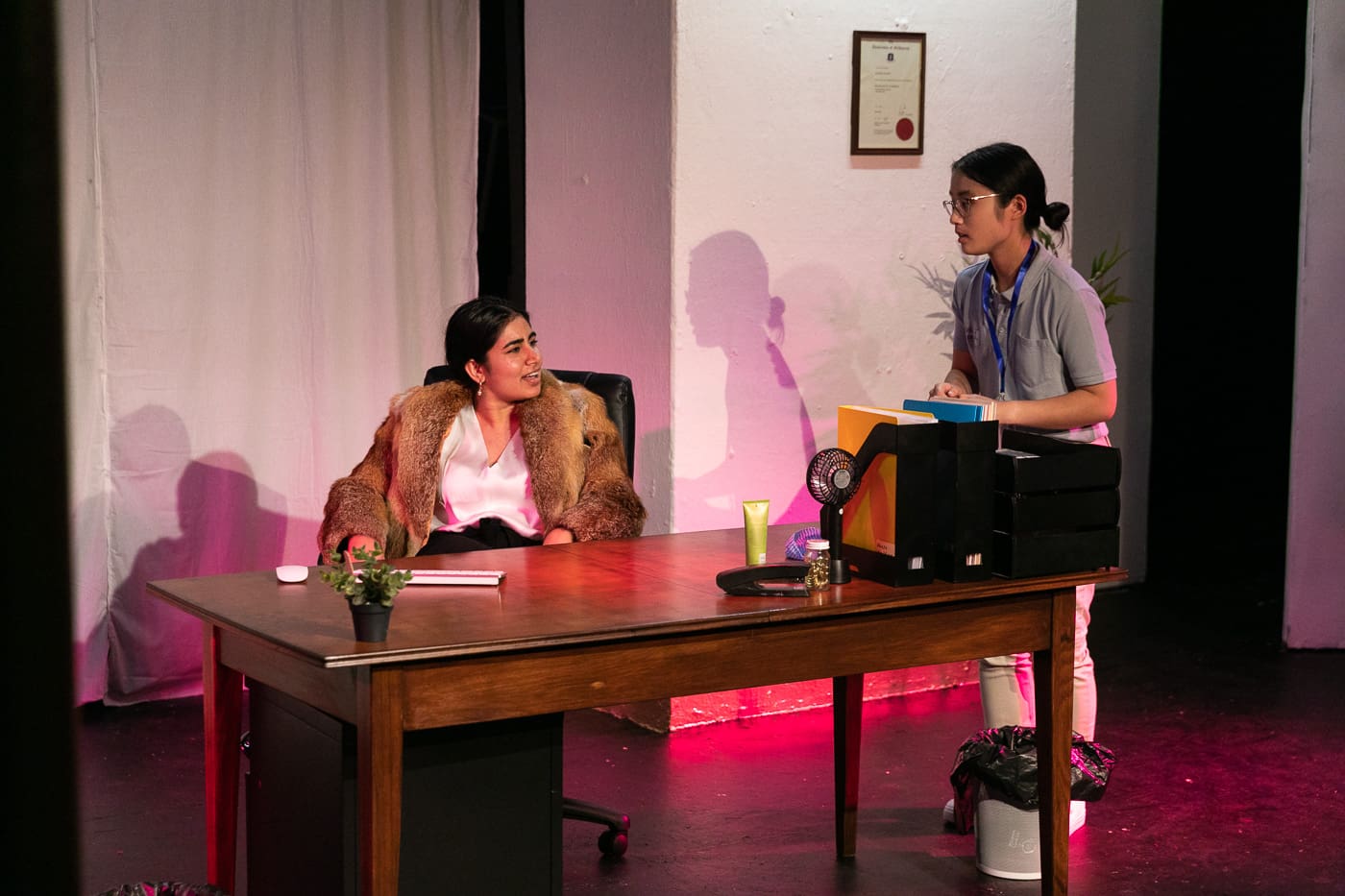Sometimes, when I am looking particularly despondent, my mother likes to tell me about the first time my grandmother held me in her arms. She tells me that bà cradled me and rubbed my back and told my mother that I would grow up to be strong, a beautiful woman. It has been almost twenty years since that moment, now, and I don’t know if I can check any of those boxes, but I still can’t help but hope that one day I will fit into every little niche of expectation and make my grandmother proud, even if she’s not there to see it.
It’s these memories and feelings that came out when watching this production. An exploration of the intricacies of what it means to exist, be perceived, and experience loss as Asian and woman in the modern Australian context. Rice, written by playwright Michele Lee, is effectively realised in the depths of the Cellar Theatre; deceptively minimalist at the outlook, glorious attention to detail wraps itself around the production, a testament to the efforts of cast and crew.
The ease and efficacy that the two-woman cast of the show, Shalvi Singh and Jacinta Lin, weave themselves through stage and story should be commended. As Nisha Gupta, a beleaguered Executive Officer of Bengali heritage, the stunningly charismatic Singh emanates presence from every corner of the stage, fringed with tinges of desperate exhaustion that only the hells of corporate overtime can manifest, exacerbated by the ghost of a cultural homeland that feels like it is slipping out from beneath one’s skin. Tempering this anxious charm is Lin’s performance as Yvette Tang, the Chinese cleaning lady that berates (cares for) Nisha in the way only an Asian aunty really can. In this role, Lin portrays the complexity of Asian-immigrant motherhood, and the expectations that such mothers hold for their children and themselves. Together, the two characters explore ambition and sacrifice as both limited and empowered by their respective identities’ nuances.
Juggling a cast of characters between themselves, I was impressed at the skill and speed in which Singh and Lin were able to switch between roles. The first role-change was to me a blink-and-you’ll-miss-it moment that I had to spend some time recalibrating my perspective for. Although it took a little while to orient myself to the conventions of the play, the conviction withwhich the actresses exuded distinct characters smoothed over much of the confusion in later scenes; Lin’s mastery over tone and posture is a pleasure to witness, and the velocity at which she switches gears from aggressively passive-aggressive Chinese mother to the Platonic ideal of all the cisgender, heterosexual white men who have ever ni hao’d me in the street (the joke is I am Vietnamese-Cantonese) was terrifying and intoxicating to behold. Likewise, Singh easily shifts across the spectrum of her roles, moving with grace from girlboss (Nisha) to gremlin (teenage boy who listens to Lady Gaga in his father’s office in the dead of night).
The attention to detail of this production was marvellous; detailed, meticulous props—suspiciously realistic takeaway leftovers and a kathi roll, a Bachelor’s certificate of Commerce in Nisha’s name hanging atop the wall, binders with canon-compliant meeting agendas stuffed inside them despite being outside the line of sight of the audience, amongst other things—bring warmth and colour (this is where a “haha-colour-get-it-because-POC” joke gets made) to anotherwise minimal set, comprised of primarily a wooden desk and an office chair. It is not merely the changes of physical environment that aid and abet meaning within this production; simplistic costume changes (though I don’t know if the use of a saree counts as simple; how did they pleat it so fast? What did they use? What are their secrets?) help to flesh out and distinguish character, as does subtle alteration to Nisha’s makeup from a bold, Western eyeshadow in the first half of the play to a Bollywood-esque eyeliner in the second half, marking a transition from the Western hegemony to a consideration of the Indian context the characters are forced to confront. The lighting states are immaculate, fully utilising the space of the Cellar Theatre with colour states and shadows and silhouettes. Sound, too, possesses incredible efficacy, from salsa music to muffled Just Dance undercutting tense conversation to the pings of text notifications.
There is so much more I could write about in this review, outside of the stories of Nisha and Yvette, outside of the little details interposed throughout it. I could write about how I loved the character of Sherry, Yvette’s daughter, or about the fountain, or about the Russian lady in the basement who types with her index fingers. I think it is testament to the quality of the production, the thought and heart that was put into it, that the little details have built upon the foundations of this production, large enough to linger in my thoughts for so long that they have taken on a warmth that belongs to things that are living and real.
Ultimately, Rice is a production about women, and their legacy. A poignant tale of what it means to be caught between the rock and hard place of a homeland and the weight and complexity that term carries, and the desire for success as understood in the present and hope for a future better than life in the present allows. But it is also a labour of love, galvanised by a dedicated cast and crew of BIPOC women and their allies who should be celebrated as much as this story is.





